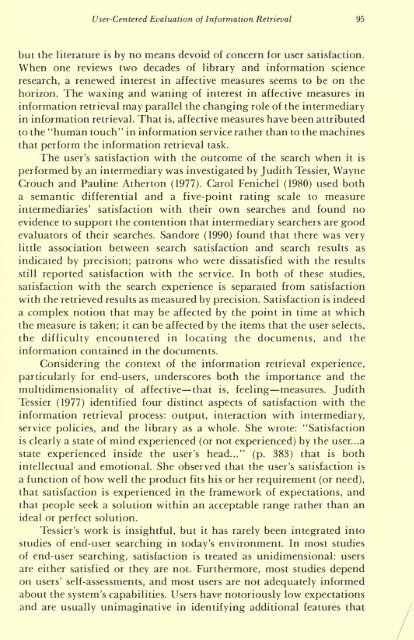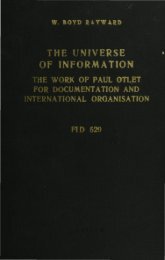User-Centered Evaluation of Information Retrieval - ideals
User-Centered Evaluation of Information Retrieval - ideals
User-Centered Evaluation of Information Retrieval - ideals
You also want an ePaper? Increase the reach of your titles
YUMPU automatically turns print PDFs into web optimized ePapers that Google loves.
<strong>User</strong>-<strong>Centered</strong> <strong>Evaluation</strong> <strong>of</strong> <strong>Information</strong> <strong>Retrieval</strong> 95<br />
but the literature is by no means devoid <strong>of</strong> concern for user satisfaction.<br />
When one reviews two decades <strong>of</strong> library and information science<br />
research, a renewed interest in affective measures seems to be on the<br />
horizon. The waxing and waning <strong>of</strong> interest in affective measures in<br />
information retrieval may parallel the changing role <strong>of</strong> the intermediary<br />
in information retrieval. That is, affective measures have been attributed<br />
to the "human touch" in information service rather than to the machines<br />
that perform the information retrieval task.<br />
The user's satisfaction with the outcome <strong>of</strong> the search when it<br />
performed by an intermediary was investigated by Judith Tessier, Wayne<br />
Crouch and Pauline Atherton (1977). Carol Fenichel (1980) used both<br />
a semantic differential and a five-point rating scale to measure<br />
intermediaries' satisfaction with their own searches and found no<br />
evidence to support the contention that intermediary searchers are good<br />
evaluators <strong>of</strong> their searches. Sandore (1990) found that there was very<br />
little association between search satisfaction and search results as<br />
indicated by precision; patrons who were dissatisfied with the results<br />
still reported satisfaction with the service. In both <strong>of</strong> these studies,<br />
satisfaction with the search experience is separated from satisfaction<br />
with the retrieved results as measured by precision. Satisfaction is indeed<br />
a complex notion that may be affected by the point in time at which<br />
the measure is taken; it can be affected by the items that the user selects,<br />
the difficulty encountered in locating the documents, and the<br />
information contained in the documents.<br />
Considering the context <strong>of</strong> the information retrieval experience,<br />
particularly for end-users, underscores both the importance and the<br />
multidimensionality <strong>of</strong> affective that is, feeling measures. Judith<br />
Tessier (1977) identified four distinct aspects <strong>of</strong> satisfaction with the<br />
information retrieval process: output, interaction with intermediary,<br />
service policies, and the library as a whole. She wrote: "Satisfaction<br />
is clearly a state <strong>of</strong> mind experienced (or not experienced) by the user... a<br />
state experienced inside the user's head..." (p. 383) that is both<br />
intellectual and emotional. She observed that the user's satisfaction is<br />
a function <strong>of</strong> how well the product fits his or her requirement (or need),<br />
that satisfaction is<br />
experienced in the framework <strong>of</strong> expectations, and<br />
that people seek a solution within an acceptable range rather than an<br />
ideal or perfect solution.<br />
Tessier's work is insightful, but it has rarely been integrated into<br />
studies <strong>of</strong> end-user searching in today's environment. In most studies<br />
<strong>of</strong> end-user searching, satisfaction is treated as unidimensional: users<br />
are either satisfied or they are not. Furthermore, most studies depend<br />
on users' self-assessments, and most users are not adequately informed<br />
about the system's capabilities. <strong>User</strong>s have notoriously low expectations<br />
and are usually unimaginative in identifying additional features that<br />
is
















